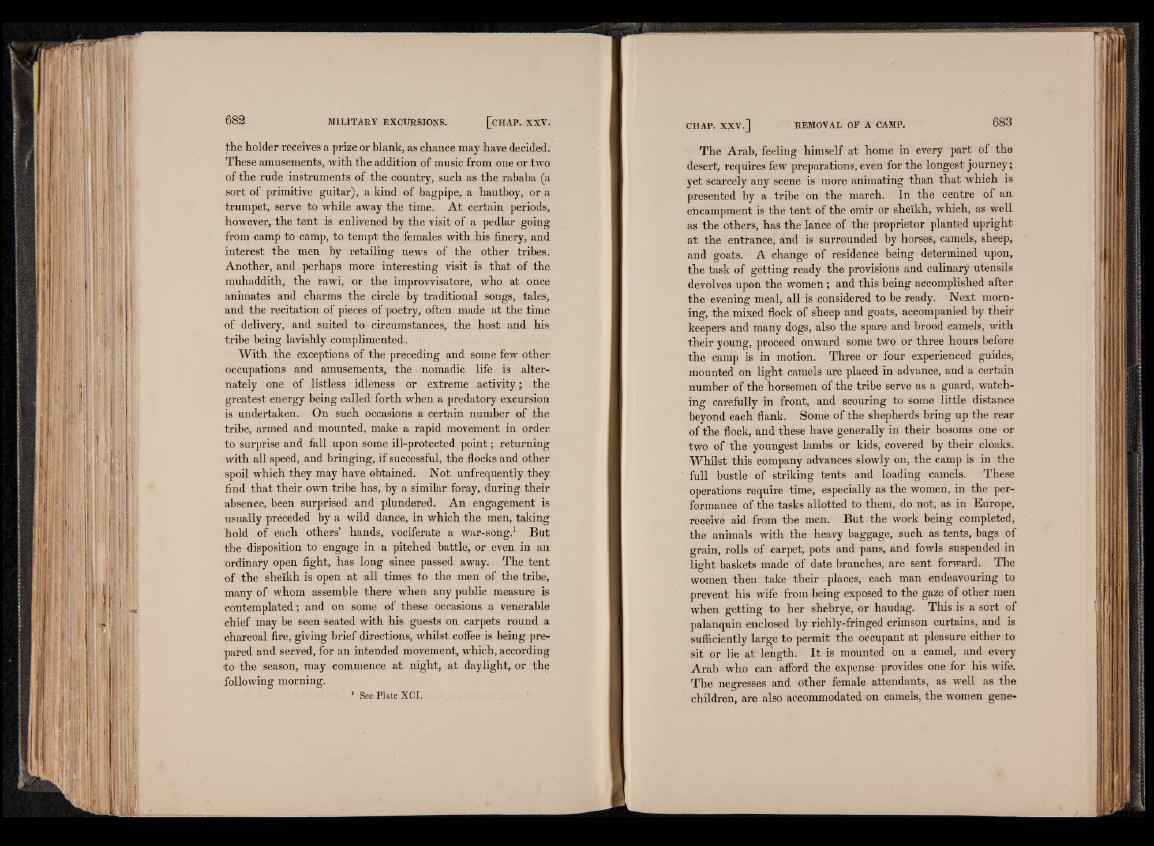
the holder receives a prize or blank, as chance may have decided.
These amusements, with the addition of music from one or two
of the rude instruments of the country, such as the rababa (a
sort of primitive guitar), a kind of bagpipe, a hautboy, or a
trumpet, serve to while away the time. At certain periods,
however, the tent is enlivened by the visit of a pedlar going
from camp to camp, to tempt the females with his finery, and
interest the men by retailing news of the other tribes.
Another, and perhaps more interesting visit is that of the
muhaddith, the rawi, or the improvvisatore, who at once
animates and charms the circle by traditional songs, .tales,
and the recitation of pieces of poetry, often made at the time
of delivery, and suited to circumstances, the host and hia
tribe being lavishly complimented.
With the exceptions of the preceding and some few other
occupations and amusements, the nomadic life is alternately
one of listless idleness or extreme activity; the
greatest energy being called forth when a predatory excursion
is undertaken. On such occasions a certain number of the
tribe, armed and mounted, make a rapid movement in order
to surprise and fall upon some ill-protected point ; returning
with all speed, and bringing, if successful, the flocks and other
spoil which they may have obtained. Not unfrequently they
find that their own tribe has, by a similar foray, during their
absence, been surprised and plundered. An engagement is
usually preceded by a wild dance, in which the men, taking
hold of each others’ hands, vociferate a war-song.1 But
the disposition to engage in a pitched battle, or even in an
ordinary open fight, has long since passed away. The tent
of the sheikh is open at all times to the men of the tribe,
many of whom assemble there when any public measure is
contemplated; and on some of these occasions a venerable
chief may be seen seated with his guests on carpets round a
charcoal fire, giving brief directions, whilst coffee is being prepared
and served, for an intended movement, which, according
<to the season, may commence at night, at daylight, or the
following morning.
The Arab, feeling himself at home in every part of the
desert, requires few preparations, even for the longest journey;
yet scarcely any scene is more animating than that which is
presented by a tribe on the march. In the centre of an
encampment is the tent of the emir or sheikh, which, as well
as the others, has the lance of the proprietor planted upright,
at the entrance, and is surrounded by horses, camels, sheep,
and goats. A change of residence being determined upon,
the task of getting ready the provisions and culinary utensils
devolves upon the women; and this being accomplished after
the evening meal, all is considered to be ready. Next morning,
the mixed flock of sheep and goats, accompanied by their
keepers and many dogs, also the spare and brood camels, with
their young, proceed onward some two or three hours before
the camp is in motion. Three or four experienced guides,
mounted on light camels are placed in advance, and a certain
number of the horsemen of the tribe serve as a guard, watching
carefully in front, and scouring to some little distance
beyond each flank. Some of the shepherds bring up the rear
of the flock, and these have generally in their bosoms one or
two of the youngest lambs or kids, covered by their cloaks.
Whilst this company advances slowly on, the camp is in the
full bustle of striking tents and loading camels. These
operations require time, especially as the women, in the performance
of the tasks allotted to them, do not, as in Europe,
receive aid from the men. But the work being completed,
the animals with the heavy baggage, such as tents, bags of
grain, rolls of carpet, pots and pans, and fowls suspended in
light baskets made of date branches, are sent forward. The
women then take their places, each man endeavouring to
prevent his wife from being exposed to the gaze of other men
when getting to her shebrye, or haudag. This is a sort of
palanquin enclosed by richly-fringed crimson curtains, and is
sufficiently large to permit the occupant at pleasure either to
sit or lie at length. It is mounted on a camel, and every
Arab who can afford the expense provides one for his wife.
The negresses and other female attendants, as well as the
children, are also accommodated on camels, the women gene